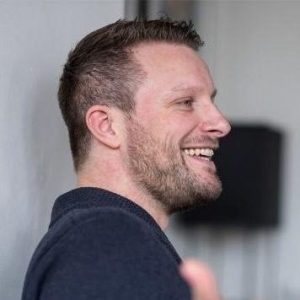As a young, innovative company we love to invite students into our office and have them work with us on one of our projects. Which is one of the many reasons we work together with the Fontys University of Applied Sciences. Martijn Lamers is a teacher and is director of the minor data science. In the context of ‘company case’ assignments, he has supervised many of the students during their time working with us. We invited him for a good talk on data science, student projects and the future of education.
It is clear that Martijn Lamers has a heart for data science, people and teaching. With a background in both psychology and IT, he has a solid understanding of both people and data science. As a company always concerned with keeping the ‘human touch’ in big data alive, we instantly feel a kind of kinship with this well-spoken lecturer.
The role of companies in education
We believe that there is an important role to play for companies in education, now and in the future. Lamers agrees with us, telling us about the so-called ‘proftaak’: a practical project by a group of six students to put their skills into practice. “In this project, students need to run a project from beginning to end, from data collection to reporting. Everything comes together, it’s no longer fragmented and theoretical.” Lamers explains. He tells us that these projects are often done in collaboration with companies, for good reasons.
Lamers indicates four reasons for collaboration between education and companies. The first is that finding enough big, interesting and available datasets for several groups of students is not easy without involving companies. Secondly, he explains that companies know what is happening in the industry, making student projects completed for a company fit better in the contemporary industry. Thirdly, students working with companies makes students feel like they are contributing something to society. “The project doesn’t just disappear in the bin after it’s finished.” He jokes. “It’s much more fun for students to work with real data in a real company, solving real problems.”
Additionally, working for a company is an important part of a student’s personal development. “At some point you need to break through the passive mentality of a student waiting for an assignment.” Working in a company is a good way to teach students a new ‘working’ mentality that they will need when they start their careers.
Finally, Lamers also takes explains why companies are motivated to work with Fontys: “Both parties benefit from the project: companies get access to young, motivated students to help them with their projects and there are limited costs and it allows students to learn from companies and work with real data.”
The future of education
Regarding the future of education, Lamers clearly envisions the role that companies will continue to play. “I think the role of companies will become bigger in the education of the future.” He explains. “At Fontys, we now start inviting companies into the classroom earlier than we did before. It gives students access to the knowledge held by industry professionals.”
It does affect the role as teacher. “Students are sometimes left to ‘figure out’ a lot for themselves, especially when companies are involved. That is not necessarily bad, but it is still important for students to be taught theory and be guided by a teacher.”
Working with Datastreams
We are proud to be one of the companies that Fontys can turn to when a group of students needs a good dataset or exciting project to work on. In fact, five groups have worked with us since last year, with positive results. When asked for his feedback on his and students’ experience in working with us, Lamers praises the fact that we like to provide sizeable sample sets within a short timeframe, allowing students to get to work quickly. Some students have chosen to continue working with us after the project ended, are clear signs that we are doing the right thing!
We understand that, more than ever, to get the most out of their talents, students need to work with real data on real projects in innovative companies. Why not start a collaboration today?


 Feel free to contact me, and I will be more than happy to answer all of your questions.
Feel free to contact me, and I will be more than happy to answer all of your questions.